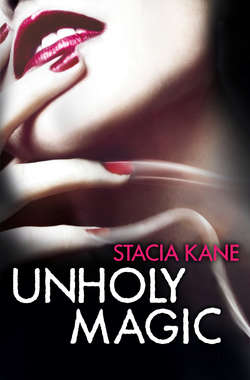Читать книгу Unholy Magic - Stacia Kane, Stacia Kane - Страница 12
Chapter Eight
ОглавлениеPunishment of both crime and sin is the exclusive dominion of the Church. That punishment begins before death. Be assured it continues after it.
—The Book of Truth, Veraxis, Article 220
There were lots of better ways to spend the free hours after Holy Day services, but Chess wasn’t in a position to enjoy any of them. A pity, that. She had a few keshes freshly rolled at home, a blanket without too many holes in it, and a disc copy of ten episodes of Roger Pyle’s television show—not her usual thing, but she figured it could be a decent afternoon. And a decent afternoon was worth a lot these days.
Instead she was walking down the long corridor connecting the main Church building to the outbuildings, ready to go farther still into the spirit prisons. According to the Log Books, Charles Remington resided in Prison Ten; Chess intended to see if he was still there.
She wasn’t sure if she preferred him to be or not.
Her footsteps echoed around her in the tunnel-like hallway, making it sound as if she wasn’t alone. As if there was an army following her into the sterile misery of Prison Ten. She resisted the urge to turn around and check. This hall was for Church employees only. She’d had to press her index finger to the ID pad and use her key to get in; the door locked automatically behind her and she hadn’t heard the buzz of it opening again. Pale gray light filtered through the smoked glass skylights, pale blue joined it from the special bulbs lining the jointure of wall and ceiling. Of all the places in Triumph City she could possibly be at that moment, this was undoubtedly the safest.
The hair on the back of her neck didn’t quite believe it, but her brain did, and that was all that mattered. And bad as the spirit prisons were—and they were bad—at least they weren’t quite as awful as the City itself.
Most people wouldn’t take that view, but then, most of them didn’t see the eternal silent peace of the City as a terrifying, isolating vacuum, either.
She pressed her finger into the pad by the door, used her right hand to turn the key. The door buzzed and opened, and Chess entered the prison anteroom.
Goody Chambers, the prison Goody, sat behind her desk, her black bonnet neatly tied beneath her pointed, whiskery chin. Sometimes Chess wondered exactly how old the woman was; she hadn’t visibly aged a day in the nine years Chess had been with the Church, as if she’d become a septuagenarian in early middle age and stayed there.
“Good morrow.” The Goody reached for her pen, poised it over her log. “Have you a message, or are you here to see a prisoner?”
“A prisoner.”
“Name and date of death?”
Chess told her.
“Sign here, please.”
While Chess scrawled her name the Goody took a pale blue velvet robe from a hook. “You’ll need to put this on. You visited the prison during training? Very well. You may leave your clothing and effects in the dressing room there. I’ll call the elevator for you.”
Chess’s fingers shook as she unlaced her boots. She did not want to do this. She glanced over her shoulder, checked the closed door for holes and saw none. Good. A chance to shove a couple of pills down her throat, hope they calmed her nerves a little before she got on the elevator. Showing any sort of emotion—especially fear—to the dead was a huge mistake. To show it to imprisoned spirits, trapped in iron cages, subjected to punishments, was like slicing open a vein and waving it around in front of a starving tiger. Not a good idea.
